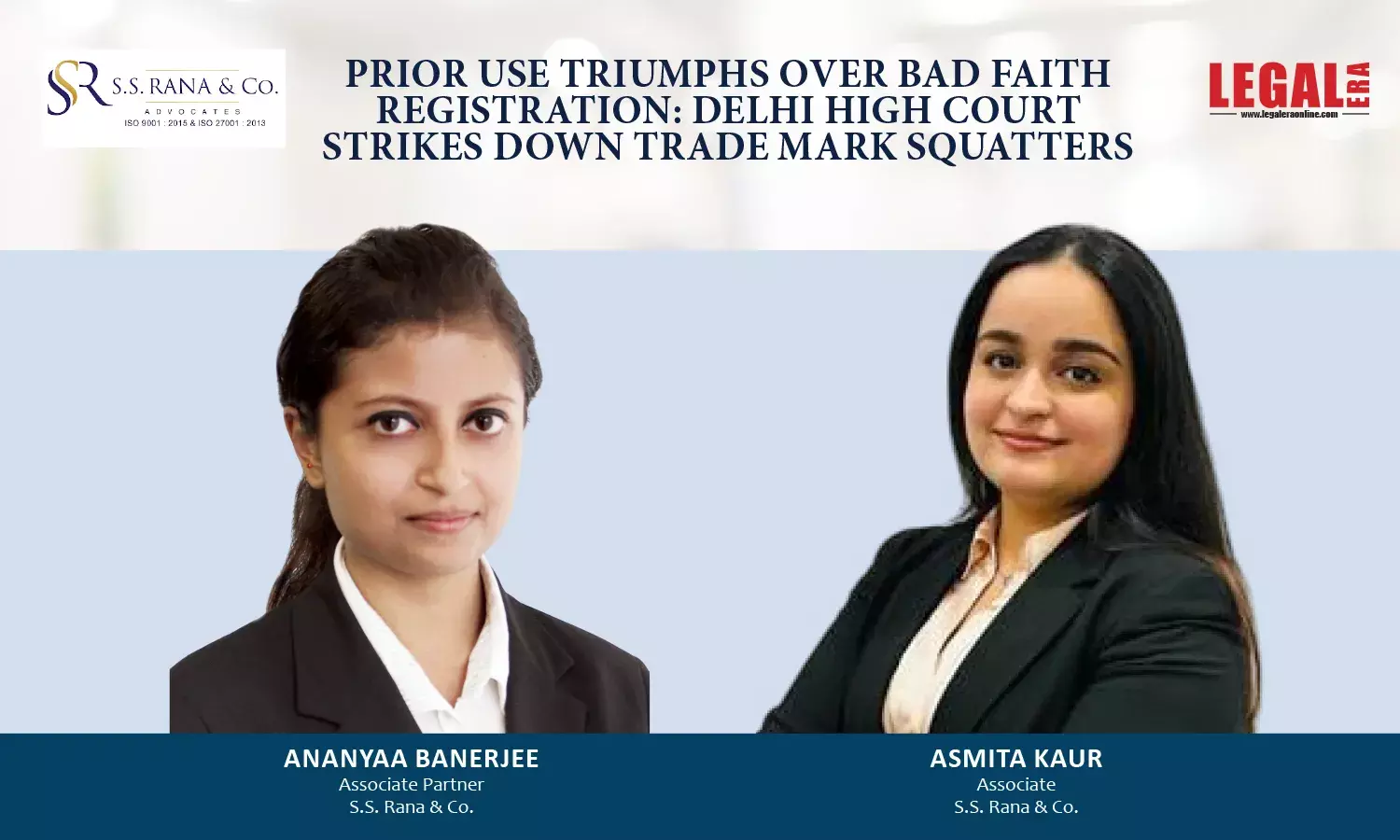Prior Use Triumphs Over Bad Faith Registration: Delhi High Court Strikes Down Trade Mark Squatters

Prior Use Triumphs Over Bad Faith Registration: Delhi High Court Strikes Down Trade Mark Squatters The Beauty of Joseon ruling reaffirms that Indian courts and authorities will not tolerate trademark squatting, setting a strong precedent for future disputesINTRODUCTIONRecent cases have highlighted how foreign brands, from luxury fashion houses to tech giants, have had to engage in costly...
Prior Use Triumphs Over Bad Faith Registration: Delhi High Court Strikes Down Trade Mark Squatters
The Beauty of Joseon ruling reaffirms that Indian courts and authorities will not tolerate trademark squatting, setting a strong precedent for future disputes
- INTRODUCTION
Recent cases have highlighted how foreign brands, from luxury fashion houses to tech giants, have had to engage in costly legal battles to reclaim their rightful trademarks from domestic infringers. Indian Courts have repeatedly condemned such practices, emphasizing that bad faith registrations are an abuse of the trademark system and contrary to public policy.
The Beauty of Joseon case is thelatest in a series of rulings aimed at curbing this unethical practice. By enforcing Section 11(10)(ii) of the Trademarks Act, 1999, which prohibits bad faith filings, the court has reinforced that the Indian trademark law prioritizes genuine commercial intent over opportunistic registrations.
The Hon’ble Delhi High Court, in Goodai Global Inc. v. Shahnawaz Siddiqu & Anr., addressed a case of alleged bad faith trademark registration and trademark squatting. This case revolved around Goodai Global Inc., a manufacturer of the popular South Korean beauty brand BEAUTY OF JOSEON/ , and the cancellation of an identical trademark registered by Shahnawaz Siddiqu. The Hon’ble Delhi High Court passed an order in favor of Goodai Global Inc., while throwing light on the protection of trademarks and protecting consumers from being exploited.
- FACTS OF THE CASE
The Plaintiff, Goodai Global Inc., is a popular South Korean brand which specializes in skincare products, manufactured under the brand name BEAUTY OF JOSEON. The said brand has established significant goodwill and reputation in the market on the basis of its production of traditional Korean beauty products. The Plaintiff launched its skincare line in 2010, and began exporting its products to India in August, 2022, through various e-commerce platforms.
Upon receiving the Examination Report dated December, 2023 of its mark filed on April 04, 2024, the Plaintiff came across the Respondent, Shahnawaz Siddiqu, who had registered an almost identical trade mark, i.e., bearing Application No. 5635163 in Class 03 on October 03, 2022 on a proposed to be used basis. A comparison of both parties’ marks is shown below:
Thus, a cancellation petition was filed by the Plaintiff against the Respondent in the Delhi High Court.
One of the most effective legal remedies available is a rectification petition under Section 47 and 57 of the Trademarks Act, 1999, which allows rightful brand owners to challenge fraudulently obtained trademarks
- CONTENTIONS OF THE PARTIES:
PLAINTIFF’S SUBMISSIONS
The Plaintiff (Goodai Global Inc.) made the following submissions:
1. PRIOR ADOPTION AND USE OF TRADEMARK
The Plaintiff launched its skincare brand under the trademark in 2010 thereafter, began exporting its products under the said trademark in August 2022 to India, while the Respondent allegedly adopted its trademark in 2023. Thus, the Plaintiff was much prior in terms of adoption and use of the captioned mark.
2. IDENTICAL TRADEMARKS/GOODS-
The goods applied for by the Respondent were identical and bound to cause confusion and deception in the eyes of the public and members of trade, as the points of purchase, trade channels and consumers are identical. Adoption of the impugned mark would give unfair advantage to the Respondent’s products and would cause damage to the Plaintiff.
3. BAD FAITH REGISTRATION
The counsel for the Plaintiff submitted that the Respondent applied for and registered the impugned mark, after the Plaintiff entered the Indian market, in an attempt to pass off its goods as those of the Plaintiff’s. Thus, the Plaintiff was the ‘person aggrieved’.
RESPONDENT SUBMISSIONS
The Respondent was served several notices, however, did not file any response nor made any appearance during the hearings.
- COURTS OBSERVATIONS
Hon’ble Justice, Mr. Amit Bansal observed that the Respondent’s mark was almost identical to the mark of the Plaintiff , featuring black Hangeul characters, which is the Korean language, translating to ‘BEAUTY OF JOSEON’. He also observed that the term ‘Joseon’ is a historical Korean dynasty, thus, the Respondent could not have any bonafide reason for adoption of the impugned mark.
Further, the Hon’ble High Court also observed that the Respondent had applied for identical/similar goods, making the target consumers of the parties identical. The Hon’ble Delhi High Court was also of the opinion that since the Plaintiff has been using its mark since 2010, it has acquired immense goodwill and reputation, and use of the impugned mark by the Respondent ought to cause confusion and deception in the minds of the purchasing public.
The Hon’ble Delhi High Court declared that the Respondent had obtained the said registration in ‘bad faith’ and had clearly attempted ‘trademark squatting’. The Hon’ble Delhi High Court ordered the cancellation of the Respondent’s trademark registration and proclaimed Plaintiff’s exclusive rights over the BEAUTY OF JOSEON/trademark.
- CONCLUSION
The Beauty of Joseon case serves as a wake-up call for international brands seeking to establish or expand their presence in India. With the growing prevalence of trademark squatting, businesses must remain vigilant by actively monitoring the Registry for unauthorized filings that mimic their established brands. The longer an infringing mark remains on the register, the more challenging and costly it becomes to remove, or take other enforcement actions.
One of the most effective legal remedies available is a rectification petition under Section 47 and 57 of the Trademarks Act, 1999, which allows rightful brand owners to challenge fraudulently obtained trademarks. Such actions can be pursued before the Trademarks Registry or the High Courts, depending on the circumstances and prevent dilution of their trademarks, which will later help while establishing a business presence.
For international brands, early action is key—filing oppositions against questionable applications at the advertisement stage can prevent the need for rectification later. However, if an infringing mark has already been registered, rectification petitions provide a powerful mechanism to clean the register of bad-faith filings.
With India emerging as a lucrative market for global brands, trademark vigilance, proactive enforcement, and swift legal action are essential to safeguarding intellectual property rights. The Beauty of Joseon ruling reaffirms that Indian courts and authorities will not tolerate trademark squatting, setting a strong precedent for future disputes.
Disclaimer – The views expressed in this article are the personal views of the authors and are purely informative in nature.





